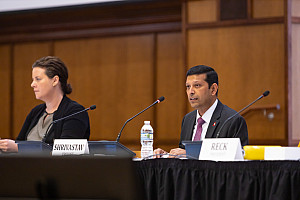Integrated and agile: Bloomington State of the Campus focuses on future
By Office of the Provost
April 07, 2023
IU Bloomington Provost and Executive Vice President Rahul Shrivastav celebrated the campus’s historical strengths and outlined an innovative path forward in his State of the Campus address, delivered during the April 4 Bloomington Faculty Council meeting in Presidents Hall.
For the first time since 2019, the speech was delivered in person.
Speaking of collaborative efforts with President Pamela Whitten regarding IU 2030, Shrivastav began with a preview, signaling the significance of the priorities outlined in the IUB 2030 strategic plan: “We are resilient, creative as ever, and ready to chase new heights of student success, transformative research and creativity, and service to our communities across Indiana and the world.”

After recognizing IU Bloomington’s legacy of creative risk, impact across schools and departments, and carefully cultivated relationships with learners and communities around the world, he characterized the present context of higher education. In a world forever changed by the pandemic and amid public skepticism about the work of universities, he emphasized the opportunities for institutions of higher education to persist in challenging convention, experimenting, learning and inspiring.
Shrivastav tied these opportunities to the campus’s emerging strategic plan, returning often to the themes of deep collaboration and agility in implementing change to align with an ever more interconnected and complex world.
“Our priorities for undergraduate, graduate and professional students alike hinge on the connections and mentorship — among peers, faculty and staff — that promote retention, progression, graduation and lifetimes of success and fulfillment,” Shrivastav said.
Highlighting the university-wide commitment to student success as a presidential and IU Bloomington priority, he announced commitments to expand experiential learning opportunities for undergraduate students, improve student academic success in courses that have the highest failure and withdrawal rates, and renovate learning spaces across campus.
With the aim of bridging academic and campus life, better serving diverse student populations, improving student well-being, and engaging with students more proactively, a new Office of Student Life will integrate the efforts of Student Affairs, IU Corps, and student-facing components of Residential Programs and Services.
As part of this alignment for student success, the Hutton Honors College will soon report directly to the provost. The dean will join the campus leadership team, and the Honors College will begin overseeing major scholarship programs for the highest-achieving students.
This news came with three leadership announcements: Vasti Torres as acting vice provost for undergraduate education, Rebecca Spang as acting dean of the Hutton Honors College, and David Daleke as dean of the IU Graduate School Bloomington and vice provost for graduate education.
After acknowledging progress secured collaboratively with Whitten and other key leaders related to graduate student stipends, well-being resources and pathways to address grievances, Shrivastav outlined several priorities for graduate education, including a reduction in median time-to-degree, designing more flexible curricula and offering mentorship training for faculty. He also announced a new $1 million incentive program for schools and departments to spark new degree innovations in online, hybrid and low-residency formats.
“We know learning extends far beyond the classroom,” Shrivastav said, “so we must create a nurturing and supportive environment across IUB where students’ needs are met, their aspirations are encouraged, and their ventures are championed.”
Addressing research priorities, Shrivastav announced a new $1 million commitment from the campus toward additional support for grant proposal development. He also outlined the second phase of Faculty 100; the first phase yielded 29 new faculty positions selected for funding.
He went on to define the charges of two recently formed executive committees: one dedicated to advancing artificial intelligence, and the other committed to arts, humanities and culture.
“To me, what clearly distinguishes IUB within the highest tier of America’s public research universities is specifically the depth of creativity and expertise in the arts, humanities and culture that we can bring to every possible solution, to enrich every member of our community …” Shrivastav said. “Concurrently, we are serious about leveraging our historic strengths, as well as our emerging opportunities, to creatively make Bloomington and the surrounding region a more vibrant place to live and thrive.”
Shrivastav indicated that contributing to vibrance locally and globally would require many forms of deep collaboration — including fellow IU campuses, economic development committees, community resilience task forces, health care workers and P-12 teachers.
In closing his address, Shrivastav articulated a set of intentional commitments that cross each of the IUB 2030 pillars: diversity, equity and inclusion; academic freedom; interdisciplinary collaboration; creativity and adaptability; and honoring and lifting up the people who compose IU Bloomington.
“If there is one unmistakable element of the IUB spirit, it is care for one another,” Shrivastav said, noting an observation from the 2023 Senior Recognition Brunch. “Each student who spoke celebrated our campus’s caring culture. No matter the challenges and uncertainties we encounter, we are kind and compassionate and lift up our fellow Hoosiers.”